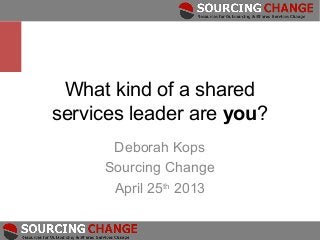
What kind of a shared services leader are you?
- 1. What kind of a shared services leader are you? Deborah Kops Sourcing Change April 25th 2013
- 2. Are there different pathways to shared services leadership…with each suggesting a different mandate and degree of change? To find out, Sourcing Change and sharedserviceslink.com collaborated on a survey earlier this year.
- 3. We saw four different paths And postulated that each career path suggests a different approach to change
- 4. • Moved up the ranks in one organization-- at least 10-15 years of in one company, starting out in a relatively junior position • Manage a narrow scope—often focused in your area of competency • Have superb stakeholder relations—strong peer network • Are known to be dependable—deliver without a lot of fuss • Expand scope because you are a steady hand—not actively building an empire • Have golden handcuffs—ambition is to continue in place • Decorate the office with lots of office golf paraphernalia—will retire from your post
- 5. • Know where the lavatories are--some but not excessive tenure • Sat elsewhere in the organization—either a line or staff job— before taking on shared services • Are looking at a fix-it opportunity -- operational mess, screaming stakeholders, or sudden resignation at the top Are charged with getting back on track--no expectation for more than stabilization/expansion • Rock the boat just enough -- seen as ambitious but dependable • Have been promised bigger and better things—short term test with the next job in sight • Work for someone who covers their back--strong patron/mentor in place
- 6. • Have little sponsorship/no blockage –boss is • “indulgent” but not convinced • Put their careers on the line—you fix it or you move on • Both run the function/change the function—scope • is day-to-day responsibility • Are blessed with a strong team--safe to turn attention • to transformation • Use their networks—deployment is opportunistic, not strategic • Go it alone--little corporate support so third parties are key • Are looking for a new challenge—boredom drove you to it
- 7. • Believe that the status quo is not acceptable—the more • feathers ruffled, the better • Have top sponsorship in place—with full hunting rights • Were external hires--power base comes from successful implementation or expansion of a shared services program • Are old shared services hands--continually increasing responsibility, and honing tools/methodologies • See themselves as shared services rock stars--much in demand as speaker at industry conferences and roundtables • Are on headhunters’ speed dials-- always keeping eyes out for the next opportunity • Hold platinum frequent flyer status—flight attendants bow down
- 9. About the survey responses • Select bunch: 68 respondents • Across all industries: manufacturing primary industry • Good distribution by revenue: 48% between $2-10 billion • Singular focus: almost 50% responsible for only one function • Moderate experience: 58% with 2-9 years • Long tenure in organization: 66% +5 years/38% +10 years
- 10. What did we find? One overarching mantra: Expand the existing shared services model, maintaining the same quality of operations No matter the career path, tenure, or experience in the organization!
- 11. What did we find?
- 12. What did we find? Career paths evenly distributed
- 13. With few surprises • Less tenure/more purview for change – 2-9 year veterans more likely to rock the boat • Lifers run one country/function • Loyalists run multiple functions • More tenure = more scope • 5-9 years in one organization/role normative
- 14. Implications for organizations • No obvious leader--no industry ahead of others • Bigger is better—obtaining scale main focus • Keep calm and carry on--silent running still the expectation • Talk is cheap--buzz about transforming business processes not yet reality • Organizational change not around the corner—active embrace of GBS some years off
- 15. Implications for shared services leaders • Knowing the secret handshake critical -- Tribal knowledge valuable • Safe pair of hands valued—expectations of change are low • Many internal imports into shared services— companies look outside the function/within the company • Change agents need not apply (yet)— operations track record still more important • There’s no place like home--Best career opportunities may be down the hall!
